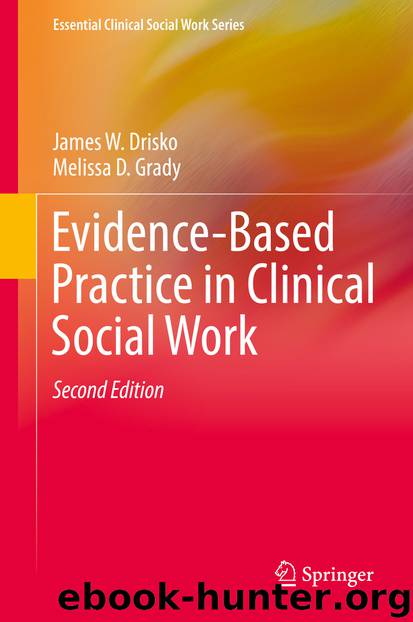Evidence-Based Practice in Clinical Social Work by James W. Drisko & Melissa D. Grady

Author:James W. Drisko & Melissa D. Grady
Language: eng
Format: epub
ISBN: 9783030152246
Publisher: Springer International Publishing
Specifying the Systematic Review Topic
To start a systematic review, the topic it will cover must be clearly stated (Higgins & Green, 2011). This step is a guide to the researchers but also keeps the review focused. It also sets boundaries on what topics, and what kinds of research, will be studied from the outset. Its purpose is to keep systematic reviews focused and to limit alterations to the review to include material of interest to the authors but not quite on topic or not using high-quality methods.
Applications to register systematic reviews at both the Cochrane Collaboration and the Campbell Collaboration require a clear statement of the review focus. Scholars and researchers must apply to register a proposed systematic review before it is started. A team of peer reviewers evaluate each application. The peer reviewers look for a clear focus and a detailed research plan consistent with the Cochrane Handbook standards (Higgins & Green, 2011). Only proposals that meet the quality standards are accepted and registered. Clinicians may find some reviews in their preliminary stages listed online as “registered” or “in progress.” Such reviews do not (yet) include any results. This can be frustrating as it does not help in practice decision-making, but it shows such knowledge may be available in the near future. It also tells other researchers that the topic is taken.
Cochrane and Campbell systematic reviews are team efforts (Littell, Corcoran, & Pillai, 2008). Several people, ideally including at least one consumer, constitute the review team (Higgins & Green, 2011, section 2.3.4.1). Not only researchers but also policy-makers and clinicians may be included as well. This range of review team members should bring in some diversity of viewpoints about the purposes of the review and serve as some check on its final report. It also allows for more than a single researcher to assess each piece of research, again as an effort to limit bias.
Researchers undertaking a systematic review must also declare their “interests and commercial sponsorship” to set forth any potential conflicts of interest. Sponsorship of Cochrane reviews by any commercial interest is prohibited. Noncommercial sponsors of Cochrane systematic reviews, such as foundations offering research funding, must agree to have no influence over its process and final report content (Higgins & Green, 2011, 2.6).
Download
This site does not store any files on its server. We only index and link to content provided by other sites. Please contact the content providers to delete copyright contents if any and email us, we'll remove relevant links or contents immediately.
The Secret History by Donna Tartt(19088)
The Social Justice Warrior Handbook by Lisa De Pasquale(12190)
Thirteen Reasons Why by Jay Asher(8909)
This Is How You Lose Her by Junot Diaz(6886)
Weapons of Math Destruction by Cathy O'Neil(6279)
Zero to One by Peter Thiel(5802)
Beartown by Fredrik Backman(5754)
The Myth of the Strong Leader by Archie Brown(5507)
The Fire Next Time by James Baldwin(5444)
How Democracies Die by Steven Levitsky & Daniel Ziblatt(5218)
Promise Me, Dad by Joe Biden(5153)
Stone's Rules by Roger Stone(5087)
A Higher Loyalty: Truth, Lies, and Leadership by James Comey(4963)
100 Deadly Skills by Clint Emerson(4925)
Rise and Kill First by Ronen Bergman(4788)
Secrecy World by Jake Bernstein(4753)
The David Icke Guide to the Global Conspiracy (and how to end it) by David Icke(4718)
The Farm by Tom Rob Smith(4509)
The Doomsday Machine by Daniel Ellsberg(4490)
